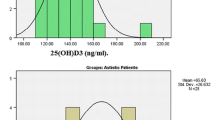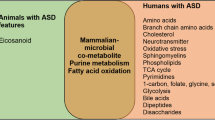Abstract
Inflammation is thought to be involved in the pathogenesis of autism spectrum disorder (ASD). Pteridine metabolites are biomarkers of inflammation that increase on immune system activation. In this study, we investigated the urinary pteridine metabolites in ASD patients as a possible biomarker for immune activation and inflammation. This observational, cross-sectional, prospective study collected urine samples from 212 patients with ASD and 68 age- and sex-matched healthy individuals. Urine neopterin (NE) and biopterin (BIO) levels were measured. Patients who had chronic disorders, active infection at the time of sampling, or high C-reactive protein levels were excluded. The urine NE and BIO concentrations were determined by high-performance liquid chromatography. The ratios of both NE and BIO to creatinine (CRE) were used to standardise the measurements. The NE/CRE and NE/BIO levels were significantly higher in ASD patients than controls. Univariate and multivariate models revealed a significant increase in NE/CRE and NE/BIO in ASD patients. There was a significant relationship between the NE/BIO [average area under the curve (AUC) = 0.717; range: 0.637–0.797] and NE/CRE (average AUC = 0.756; range: 0.684–0.828) ratios, which distinguished individuals with ASD from controls. The elevated NE/CRE and NE/BIO ratios suggest that inflammation and T cell-mediated immunity are involved in the pathophysiology of autism. NE/BIO could serve as a diagnostic inflammatory marker in the pathogenesis of ASD.


Similar content being viewed by others
Data Availability
The data that support the findings of this study are available from the corresponding author upon reasonable request.
Abbreviations
- ACN:
-
Acetonitrile
- ASD:
-
Autism spectrum disorders
- BIO:
-
Biopterin
- CNS:
-
Central Nervous System
- CRE:
-
Creatinine
- CRP:
-
C-reactive protein
- GTP:
-
Guanosine triphosphate
- GTPCH:
-
Guanosine triphosphate – cyclohydrolase
- HPLC:
-
High – Pressure Liquid Chromatography
- IFN –γ:
-
Interferon gamma
- LoD:
-
Limit of Detection
- LoQ:
-
Limit of Quantification
- MS:
-
Multiple sclerosis
- NAOH:
-
Sodium hydroxide
- NE:
-
Neopterin
- PT:
-
Pterin
- PTPS:
-
6 – pyrovoyl – tetrahydropterin synthase
- ROC:
-
Receiver Operating Characteristics
- SPSS:
-
Statistical Package for the Social Sciences
- TRIS – HCl:
-
Tri-hydroxymethyl-aminomethane-hydrochloride
- TNF –α:
-
Tumor necrosis factor alpha
- 6PTC:
-
Pterin-6-carboxylic acid
References
Baumer N, Spence SJ (2018) Evaluation and management of the child with Autism Spectrum Disorder. Continuum (Minneap Minn) 24:248–275. https://doi.org/10.1212/CON.0000000000000578
Blau N, Thony B (2008) Pterins and related enzymes. In: Balu N, Duran M, Gibson KM (eds) Laboratory Guide to the methods in biochemical Genetics, 8 edn. Springer-Verlag, Berlin Heidelberg, pp 665–703
Burton C, Shi H, Ma Y (2016) Daily variation and effect of dietary folate on urinary pteridines. Metabolomics 12:78. https://doi.org/10.1007/s11306-016-1019-4
Ceylan MF, Uneri OS, Guney E, Ergin M, Alisik M, Goker Z, Dinc GS, Kara FK, Erel O (2014) Increased levels of serum neopterin in attention deficit/hyperactivity disorder (ADHD). J Neuroimmunol 273:111–114. https://doi.org/10.1016/j.jneuroim.2014.06.002
Christensen DL, Baio J, Van Naarden Braun K et al (2016) Prevalence and characteristics of autism spectrum disorder among children aged 8 years—autism and developmental disabilities monitoring network, 11 sites, United States, 2012. MMWR Surveill Summ 65:1–23. https://doi.org/10.15585/mmwr.ss6503a1
de Llanos AM, Espinosa-Mansilla A, Cañada-Cañada F, de la Peña AM (2011) Separation and determination of 11 marker pteridines in human urine by liquid chromatography and fluorimetric detection. J Sep Sci 34:1283–1292. https://doi.org/10.1002/jssc.201000900
DiStasio MM, Nagakura I, Nadler MJ, Anderson MP (2019) T lymphocytes and cytotoxic astrocyte blebs correlate across autism brains. Ann Neurol 86:885–898. https://doi.org/10.1002/ana.25610
Eto I, Bandy MD, Butterworth CE Jr (1992) Plasma and urinary levels of biopterin, neopterin, and related pterins and plasma levels of folate in infantile autism. J Autism Dev Disord 22:295–308. https://doi.org/10.1007/BF01058157
Hagberg L, Cinque P, Gisslen M, Brew BJ, Spudich S, Bestetti A (2010) Cerebrospinal fluid neopterin: an informative biomarker of central nervous system immune activation in HIV-1 infection. AIDS Res Ther 7:112. https://doi.org/10.1186/1742-6405-7-15
Hoffmann G, Wirleitner B, Fuchs D (2003) Potential role of immune system activation-associated production of neopterin derivatives in humans. Inflamm Res 52:313–321. https://doi.org/10.1007/s00011-003-1181-9
Huber C, Batchelor JR, Fuchs D, Hausen A, Lang A, Niederwieser D, Reibnegger G, Swetly P, Troppmair J, Wachter H (1984) Immune response-associated production of neopterin. Release from macrophages primarily under control of interferon-gamma. J Exp Med 160:310–316. https://doi.org/10.1084/jem.160.1.310
Kayaoglu MY, Girgin G, Solmaz I, Baydar T, Anlar B (2022) Urine neopterin in childhood acute demyelinating diseases: potential for differential diagnosis. Mult Scler Relat Disord 59:103662. https://doi.org/10.1016/j.msard.2022.103662
Kośliński P, Jarzemski P, Markuszewski MJ, Kaliszan R (2014) Determination of pterins in urine by HPLC with UV and fluorescent detection using different types of chromatographic stationary phases (HILIC, RP C8, RP C18). J Pharm Biomed Anal 91:37–45. https://doi.org/10.1016/j.jpba.2013.12.012
Messahel S, Pheasant AE, Pall H, Ahmed-Choudhury J, Sungum-Paliwal RS, Vostanis P (1998) Urinary levels of neopterin and biopterin in autism. Neurosci Lett 241:17–20. https://doi.org/10.1016/s0304-3940(97)00976-2
Sucher R, Schroecksnadel K, Weiss G, Margreiter R, Fuchs D, Brandacher G (2010) Neopterin, a prognostic marker in human malignancies. Cancer Lett 287:13–22. https://doi.org/10.1016/j.canlet.2009.05.008
Sweeten TL, Posey DJ, McDougle CJ (2003) High blood monocyte counts and neopterin levels in children with autistic disorder. Am J Psychiatry 160:1691–1693. https://doi.org/10.1176/appi.ajp.160.9.1691
Wachter H, Fuchs D, Hausen A, Reibnegger G, Weiss G, Werner ER (1992) Cell Biochemistry and Function. Vol. 7, Walter de Gruyter: Berlin and New York. 144–146 p
Widner B, Leblhuber F, Fuchs D (2002) Increased neopterin production and tryptophan degradation in advanced Parkinson’s disease. J Neural Transm (Vienna) 109:181–189. https://doi.org/10.1007/s007020200014
Wills S, Cabanlit M, Bennett J, Ashwood P, Amaral DG, Van de Water J (2009) Detection of autoantibodies to neural cells of the cerebellum in the plasma of subjects with autism spectrum disorders. Brain Behav Immun 23:64–74. https://doi.org/10.1016/j.bbi.2008.07.007
Zhao HX, Yin SS, Fan JG (2015) High plasma neopterin levels in chinese children with autism spectrum disorders. Int J Dev Neurosci 41:92–97. https://doi.org/10.1016/j.ijdevneu.2015.02.002
Funding
The authors did not receive support from any organization for the submitted work. The authors have no affiliation with any organization with a direct or indirect financial interest in the subject matter discussed in the manuscript.
Author information
Authors and Affiliations
Contributions
All authors have participated in (a) conception and design, or analysis and interpretation of the data; (b) drafting the article or revising it critically for important intellectual content; and (c) approval of the final version.
1. E.O.E: Conceptualization, Formal analysis, Investigation, Resources, Writing Original Draft, Project administration.
2. E.I: Validation, Resources.
3. M.S.C.: Resources, Data Curation.
4. T.Z.: Validation, Writing—Original Draft.
5. G.Y.: Writing—Review & Editing.
6. M.N.C.: Writing—Review & Editing.
7. C.A.Z.: Conceptualization, Methodology, Writing—Review & Editing, Project administration and manuscript.
8. E.K.: Writing—Review & Editing, Supervision.
Corresponding author
Ethics declarations
Ethics approval
All procedures followed were in accordance with the ethical standards of the responsible committee on human experimentation (institutional and national) and with the Helsinki Declaration of 1975, as revised in 2008. Ethics committee approval has been granted from our institution at 05.01.2023 with protocol number 564001.
Consent to participate
Informed consent has been obtained from parents of all participants.
Consent for publication
The corresponding author has the permission from the authors to publish the details of the study work.
Conflict of Interest
The authors have no conflicts of interest to declare that are relevant to the content of this article.
Additional information
Publisher’s Note
Springer Nature remains neutral with regard to jurisdictional claims in published maps and institutional affiliations.
Rights and permissions
Springer Nature or its licensor (e.g. a society or other partner) holds exclusive rights to this article under a publishing agreement with the author(s) or other rightsholder(s); author self-archiving of the accepted manuscript version of this article is solely governed by the terms of such publishing agreement and applicable law.
About this article
Cite this article
Oge-Enver, E., Isat, E., Cansever, M.S. et al. Urinary neopterin and biopterin indicate that inflammation has a role in autism spectrum disorder. Metab Brain Dis 38, 2645–2651 (2023). https://doi.org/10.1007/s11011-023-01287-3
Received:
Accepted:
Published:
Issue Date:
DOI: https://doi.org/10.1007/s11011-023-01287-3




